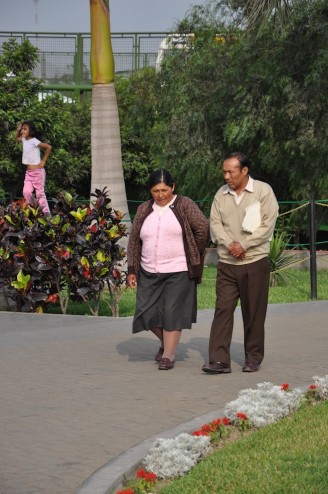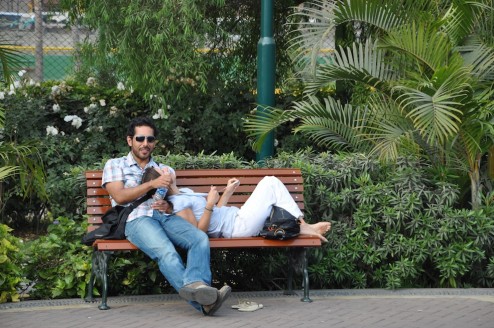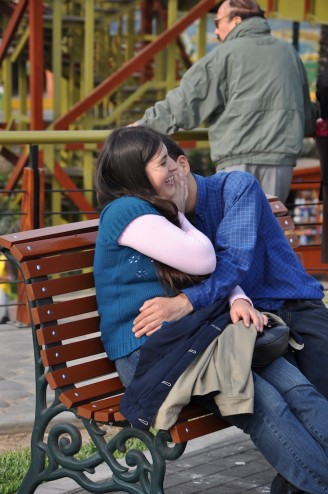Do you ever sit there, on a park bench, at the beach, or even out of your car window, and simply observe the people that walk by? What are they wearing? What do their facial expressions and body language tell you? Do you ever put words in other peoples mouths? Guessing what they are talking about.
A couple bickering. “Why are you always like that?” “You never listen.” “That’s because all you do is complain…”
A dude trying to pick up a chick. “How you doin?” “Piss off!” “Come on…” “Seriously, piss off!”
In a park in Lima, Peru, there were none of such stories. Everywhere I looked I saw stories of love:

An elderly couple reminiscing the past.

A young couple planning their future.

“You know what I’m going to do for you tonight?!”
It can be fun to imagine what is going on in others’ worlds. These interpretations tend to be based on things that have gone on in our own world, either things we have experienced directly through relationships and events, or indirectly through television shows, movies, books etc.
If you do this, then you are a social scientist, an anthropologist, a studier of people. For anyone who enjoys a little people watching, the tools I will share over the next week or so will allow you to gain deeper insights to the things you observe – both in your observations of others, and in your observations of your self.
Earlier this year I was writing about some of the gaps that I have observed:
– a gap between education at school and real life
– a gap in how knowledge is distributed between rich and poor, between academia and public, between governments and their people…
– a gap between those who gain the monetary profit from corporations and those held responsible for the corporations’ non-monetary costs to people and environment
Some of my entries over the next couple of months will be looking at how these gaps might be bridged. I will be approaching challenge by looking at the materials I’ve been researching these last six months, trying to interpret the academic jargon into everyday langugae, and apply it to everyday situations, like the people-watching scenario above.
A word of warning: while endevoring to interpret the jargon, these entries still contain it. If you feel alarmed, don’t worry, you’re not alone. Words like “Hegemony” and “Heuristics” and “Foucaultian” and “Phenomenology” almost scared me away from academia altogether. It’s worth pushing through – these words are quite illuminating and worth putting the time in to understand them.
What I will try to do is define these terms the first time I use them, and refer back to that entry when I use them later. If it’s hard to follow I suggest a quick Wiki-search – grab a quick definition, and see if it makes sense. Feel free to leave your questions in the comments section about areas I haven’t explained so well and I’ll come back to it and try. It’s really important to me to develop my communication skills so when you see them please help me by point out my owns gaps – I would really appreciate it.
The “Intellectual Toolkit” (as one of my supervisors calls it) that I will share includes a selection of methodologies, big thinker’s theories, and key debates, that are appropriate for my research in the social and political sciences.
- “Critical Discourse Analysis”
- “Phenomenology”
- “Narrative Inquiry”
- The “Agency / Structure” debate (Foucault’s views on the Power)
- Social Construction Theories (Paulo Freire’s ideas in “Pedagogy of the Oppressed”; Berger and Luckman’s ideas on “The Social Construction of Reality”; and Norman K. Denzin’s ideas on “Auto-Ethnography” )
As I have discovered each of these tools and perspectives, I have felt my eyes open to new ways understanding the people and world around me. I am coming to see how language builds stories which builds identities, culture, and worldviews, which all in all provide a context from which we come to understand the relationship between our individual realities and the Reality beyond.
I hope that by sharing this information you might enhance your people watching too!
wow.intense.i fee lfor you ,though when all is said and done it sounds like it was worth it.xee looks exactly and i mean exactly like bugs my old kombi.three years of travel in australia and all i replaced was a coil.lucky.music festivals surfing and even four wheel driving.[theyre great for that!]aah memories.anyway ,you sound wise beyong your years.thanks for the read and all the best for the wonderful adventures ahead of you.